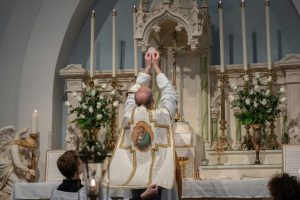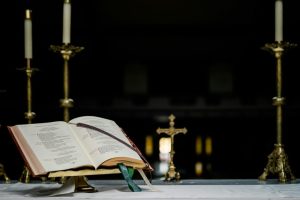It's time for the congregation to share the Sunday stage with the choir, argues a priest who wants the Mass to be sung by all. Here are a number of suggestions to help them earn their applause.
Here Is something a pastor will never hear in the back of the church after Mass: "I wish the people around me didn't sing so loud!"
In my many years at many parishes in many places, standing at the altar and facing the people at Mass, I have seldom heard the congregation singing. The people may be singing, but I can't hear them. And I doubt if they can hear one another. What we all hear is the cantor or choir and organist or musicians, whose sound is well amplified throughout the church. Wouldn't it be nice if the people in the congregation heard themselves?
The many singers and musicians I've worked with in my 40 years as a priest have been a delight to know, have dedicated years to music ministry, are very good in their craft, and are people of great faith. Having said that, I have some opinions that may ruffle a few feathers.
I think the time has come to radically rethink the role of the choir, cantor, and musicians at Sunday Mass. I think the time has come for the assembled faithful to claim as their own the role of singing. I think the time has come for those who sit in the pews on Sunday to finally hear each other in full-throated praise of God.
When I am presiding at Mass and the "Our Father" is sung a cappella, the congregation hears me sing the first two words and then I back away from the microphone or simply move my lips. What the people hear is the sound of their own voices in prayerful song. It's beautiful.
The same principle applies to the acclamations and hymns. On occasion I have filled in for a cantor at Mass. The congregation hears me sing the first couple of words of an acclamation or a hymn. Then I back away from the microphone, face the altar, and let them carry on. When they no longer hear my voice, they know that they have to do the singing. And they do. It's a prayerful experience.
The goal here is the "full, conscious, and active" participation of all the assembled people in the ministry of music. This means that all the people in the pews see themselves as "the choir." To achieve this new level of congregational singing at Sunday Mass, I would like to make the following suggestions.
Musical accompaniment should be minimal. An organ, piano, or guitar can give the correct starting note, play under the congregation's voices, and when necessary pick up or slow down the pace. Whatever instruments are used should support congregational singing and not out perform the congregation in volume or style.
If a parish has a trained choir, they could gather together to sing a hymn about five minutes before the start of Sunday Mass. This helps to set a prayerful mood. Then I suggest that they fan out into all sections of the congregation, sitting with family or friends, and assist the congregation in singing from the pews. Because choir members are usually the better singers in a parish, their presence in the pews would bolster the singing of the congregation, and give courage and confidence to the hesitant singers around them.
If a parish chooses to keep the choir and musicians in the front of the church, they should face the ambo and altar and not the congregation. They are gathered together to pray, not perform. They should make every effort not to bring attention to themselves. If a cantor is shuffling pages, or the guitarist is tightening strings, or the music director is walking around whispering instructions, the congregation's eyes shift from the ambo or altar over to the action in the choir area.
As a general rule, a microphone should be used by the cantor only to announce the hymn number or page number, to lead the congregation in the first couple of words of an acclamation or hymn, and then as needed if the congregation starts to drag or go off key. A microphone may also be used by a cantor or choir for singing the verses of the responsorial psalm, the intentions of the prayers of the faithful, and the Communion hymn verses between the people's sung response.
Ideally, the cantor should have an average voice that by its ordinary sound encourages others to sing. When the cantor has an outstanding operatic voice, people in the pews feel inadequate. This shuts them down. Instead they listen with admiration and are wowed by the singer rather than concentrating on the God whose praises are being sung.
It is difficult to carry a hymnal or worship aid when receiving Holy Communion. Hymns at this point of the Mass should be such that the congregation can sing them by heart. Compositions that have a repetitive response are ideal. Another alternative is to have those waiting in the pews sing the words of a hymn while those walking in procession simply hum the melody. Humming can be very prayerful.
A parish grade school provides an ideal setting for teaching new acclamations, responsorial psalms, and hymns throughout the year. Once the children are taught a new song, they should be instructed to bring it home and let their parents hear what they learned. The students in the parish religious education program should also take part in learning new music. The children need to know how important they are in helping the congregation to sing on Sunday.
Most parish congregations at Sunday Mass are made up of a wide variety of ages. That means that the music selected needs to include a wide variety of styles. Some music will appeal to young people, other music is more to the liking of seniors, and still other music will fit the tastes of folk enthusiasts or classical music lovers. If the music selection is all of one style (the favorite music of the director), it will soon bore many who can't relate to it.
It is important that all those in the entrance procession, especially the presiding celebrant, carry a hymnal or worship aid. This action proclaims by example that singing by everyone is important. Obviously the lector carrying the Book of the Gospels and acolytes carrying the cross or candles can't also carry a hymnal during the procession. But once they are situated in the sanctuary, they should give good example by opening a hymnal and singing.
In churches that are long and narrow, I recommend that people turn and face the center aisle for the gathering hymn. This way they can see the faces and hear the voices of those gathered across the aisle and get the feeling of being united in community.
A lot of liturgical music seems to be written for altos and sopranos, whose range is beyond the reach of ordinary voices. We basses would be very grateful if parish music ministers consider lowering musical selections at least a half-note.
Finally, a parish could schedule one or more concerts during the year. Advent and Lent would be ideal times. The Catholic Church has a rich heritage of sacred music that requires extended instrumentation and orchestration, along with intricate sung harmonies. A concert-not the Eucharist-is the place for singers and musicians to perform.
After Mass, in the back of church, people sometimes say to me, "Nice homily, Father." When they say that, I feel good. If they say, "Something you said really struck me," I feel a little better. That means their focus was not on me but on the content of the homily. But what I really like to hear people say is, "I really felt close to God this morning." Or "That was a beautiful Mass." This means that all of us in leadership roles along with all the gathered assembly did our part well, and God was praised and glorified.
The church was clean and tastefully decorated. Everyone was friendly, especially to visitors. The ushers were efficient and helpful. The acolytes handled their duties capably. The lectors were well prepared. The homily was meaningful. The eucharistic ministers were reverent. And music filled all four corners of the church. When all carry out their role to the best of their ability, the attention goes to God, not us.
After Mass a congregation often claps for the singers and musicians. It seems out of place to me that people clap at Mass because of how well the singers sang, the homilist homilized, or the servers served. We are all unworthy servants of the Lord, on whom all our attention should be focused when we are in church. People should leave church clapping with all their might for everything God has done, is doing, and will do for them.
Having said that, I would make one exception. I would like to see the day when the priest, the lectors, the eucharistic ministers, the musicians and singers all face the congregation at the end of Mass and clap for how well they, the assembled faithful, sang and participated.
This article appeared along with reader feedback in the December 2008 issue of U.S. Catholic (Vol. 73, No. 12, pages 23-27).













Add comment